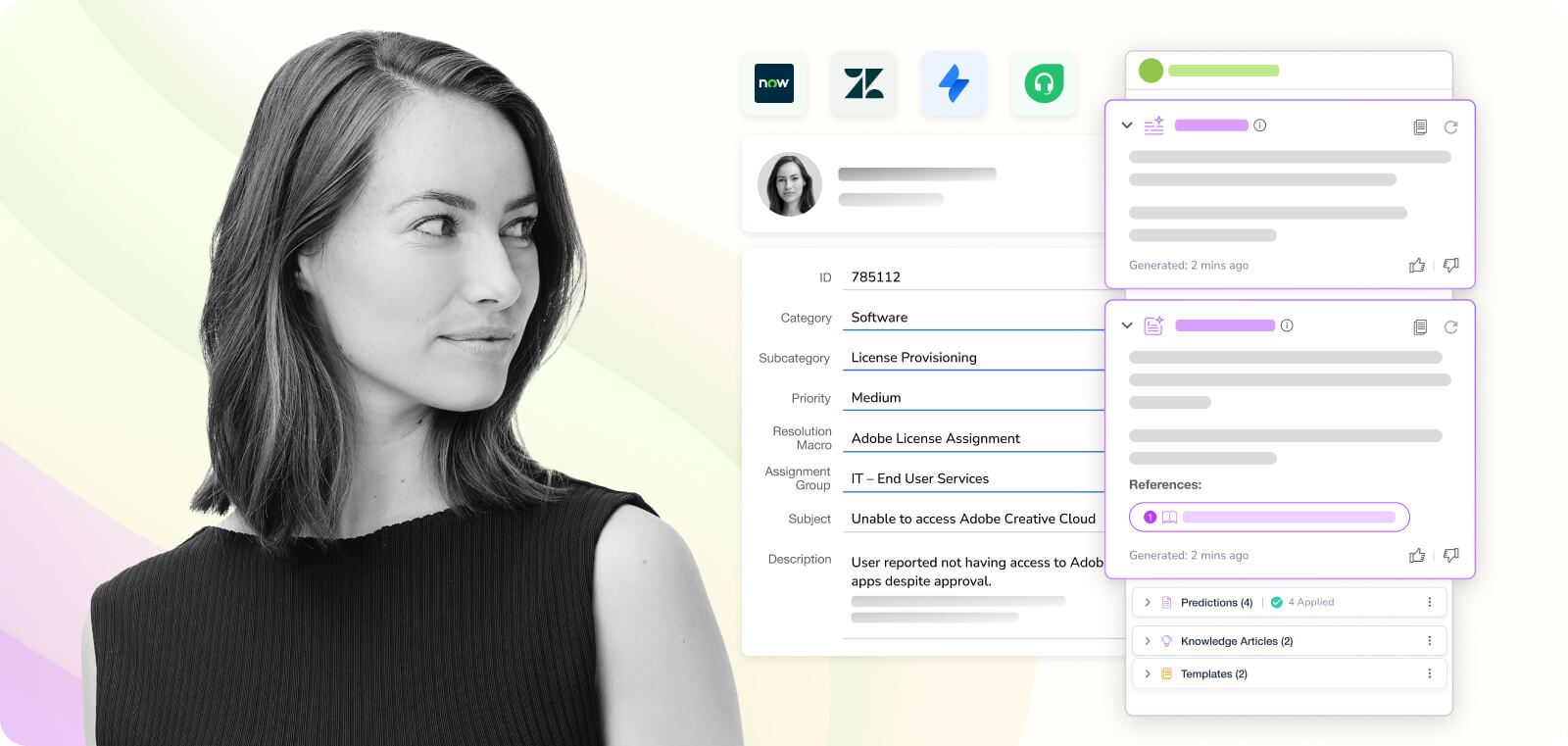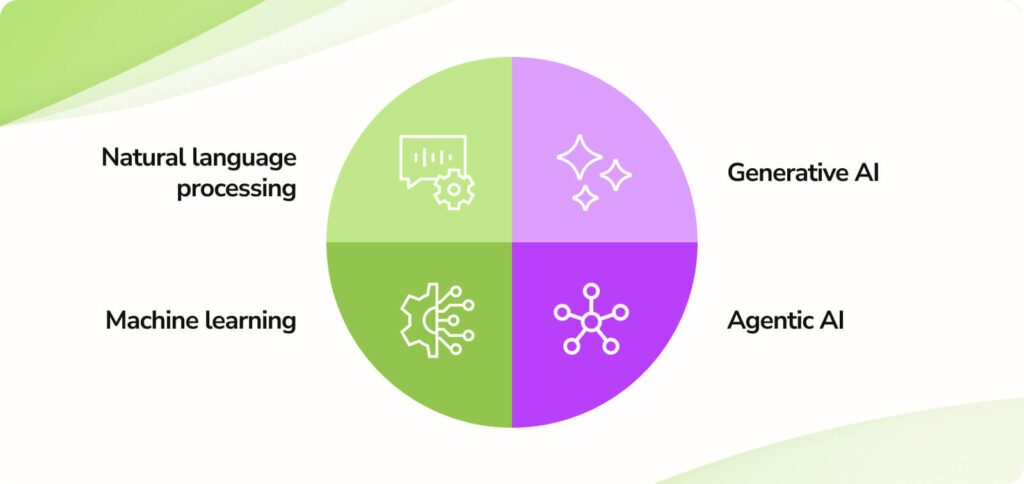What is an AI Ticketing System?
High volumes of support quickly overwhelm teams, resulting in slow response times, unhappy customers, and agent burnout. Artificial intelligence is now used to automate the ticketing process, reducing manual processes and streamlining how support requests are managed. AI ticketing systems offer a smarter, automated solution to this problem, transforming traditional help desks into proactive support centers.
An AI-based ticketing system is a next-generation help desk solution that uses Natural Language Processing (NLP) and Machine Learning (ML) to automate the entire support ticket lifecycle. This fundamental shift not only enables seamless, around-the-clock support but also empowers human agents to focus on more complex issues. AI ticketing systems support customer service agents by automating routine tasks, allowing them to dedicate more time to high-value interactions.

AI Ticketing Systems combine NLP, Machine Learning, Generative AI, and Agentic AI to automate support across the entire ticket lifecycle. They understand customer intent, categorize tickets, route to the right resource, and even resolve most of the routine issues without human intervention. By automating the ticketing process, AI eliminates manual processes, allowing enterprises to deliver true 24/7 service, reduce errors from manual triage, and significantly lower cost-per-ticket.
Our deep-dive analysis of enterprise support trends shows that organizations leveraging Agentic AI in ticketing achieve a 45% reduction in Mean Time to Resolution (MTTR) within the first year.
Key Takeaways: Why AI Ticketing is a Must for Enterprise
AI ticketing is essential because it automates the most time-consuming support functions, allowing you to scale without adding extra headcount. An AI ticketing system can help in the following ways:
- Automatically capture, categorize, and prioritize requests from all channels.
- Intelligent routing of tickets to the best-fit human or AI agent based on skills and workload.
- Autonomous resolution of common requests like password resets, with no manual agent effort.
AI ticketing systems learn from every interaction and get smarter and more efficient over time. This means ITSM teams can quickly identify recurring issues, anticipate bottlenecks, and fix problems before they happen. The result is faster resolution times, lower operational costs, and human agents focused on complex, high-value customer issues. These improvements ultimately lead to more satisfied customers.
The Core Technologies of AI Ticketing Systems
AI ticketing systems use a combination of advanced technologies to enable true intelligence and automation. Advanced AI capabilities, such as predictive analytics, are integral to modern AI-powered systems for ticketing, enabling intelligent routing, forecasting, and enhanced customer service. These components work together to understand intent, prioritize requests, and continuously improve support outcomes.
| Technology | Function |
|---|---|
| Natural Language Processing (NLP) | Understands customer language, intent, sentiment, and context. |
| Machine Learning (ML) | Learns from past tickets to improve routing, solutions, and trends. |
| Generative AI (GenAI) | Drafts intelligent responses and summarizes ticket conversations. |
| Agentic AI | Autonomously manages complex actions. |
| Predictive Analytics | Forecasts staffing needs, ticket volumes, and service trends to optimize resource allocation and support. |
| Other AI Capabilities | Enable intelligent routing, triage, and automation for faster, more efficient customer service in AI-powered systems. |
1. Natural Language Processing: Understanding Intent
Natural Language Processing is the foundation of AI ticketing automation’s ability to “read” and understand human language. NLP algorithms extract intent, sentiment, and context from requests, using these insights to classify issues accurately, detect urgency, and even adjust the response tone based on customer emotion.
For example, if a ticket says, “My account has been locked and I need urgent access for a presentation in 30 minutes,” NLP can identify the problem (“account locked”), recognize urgency (“urgent,” “30 minutes”), and route the ticket with high priority to the appropriate support team.
2. Machine Learning: Intelligent Routing & Prediction
Machine Learning powers the “thinking” and “learning” abilities of AI ticketing systems, enabling them to get smarter with every interaction. By analyzing historical ticket data and past resolutions, ML algorithms identify patterns that improve how new tickets are handled.
For example, if a company frequently receives tickets about VPN connectivity, ML can detect the trend, automatically categorize similar tickets in the future, and even recommend proven fixes to agents or resolve the issue autonomously when possible.
3. Generative AI (GenAI): Drafting and Summarization
Generative AI enhances ticketing systems by creating intelligent, context-aware responses and condensing lengthy ticket threads into clear, actionable summaries. Instead of human agents spending time reading through multiple back-and-forth messages, GenAI can provide a concise overview that highlights the root issue and key details. For example, when handling a complex billing inquiry, GenAI can generate a tailored response that explains the issue clearly, suggests possible resolutions, and maintains the brand’s professional voice.
4. Agentic AI: Autonomous Workflow Orchestration
In modern IT systems, Agentic AI represents the next leap in automation: autonomous, goal-directed intelligence that can manage complex tasks across the support ecosystem. Unlike reactive systems, Agentic AI doesn’t just wait for instructions. Instead, proactively identifies, prioritizes, and resolves issues while coordinating actions across multiple tools and platforms.
For example, if an ITSM ticketing system creates a high-severity outage ticket, an AI agent can escalate it, notify stakeholders, reroute workloads, and even trigger remediation workflows without human intervention. This allows IT teams to focus on strategy and problem-solving while the AI agents handle repetitive but mission-critical steps.
Key Benefits of Adopting an AI Ticketing System
AI ticketing systems also offer tangible benefits that directly impact operational efficiency and customer experience. By improving efficiency and consistency, these platforms enable organizations to deliver high-quality customer service. Here are the core benefits an enterprise can realize by adopting these platforms.
| Core Benefit | Quantifiable Impact |
|---|---|
| Resolution Time | Decrease Mean Time to Resolution (MTTR) by up to 45%. |
| Cost Savings | Reduce cost-per-ticket by 30−50%. |
| Agent Focus | Free up agents to spend 70% of their time on high-impact, complex tasks. |
1. Reduce Operational Costs
AI ticketing systems help lower the cost-per-ticket by automating repetitive tasks such as ticket classification, routing, and follow-ups. This reduces reliance on large manual customer support teams, minimizes errors, and accelerates resolution times, leading to significant savings in customer support operations without compromising service quality.
2. Boost Agent Productivity
By automating low-value, repetitive tasks, AI ticketing systems free agents to focus on complex, high-impact issues. Features like AI co-pilots provide real-time suggestions, response templates, and quick access to relevant data, enabling agents to work faster, make more informed decisions, and reduce burnout while maintaining high service standards.
3. Improve Customer Satisfaction (CSAT)
AI ticketing systems enhance CSAT by delivering quick, accurate, and personalized 24/7 responses. Automated ticket prioritization ensures urgent issues receive immediate attention, while consistent, high-quality AI-driven replies create a smoother, more reliable support experience. As a result, customers will be happier and more loyal over the long haul.
4. Decrease Ticket Volume
AI-driven self-service portals, chatbots, and knowledge bases deflect common inquiries before they reach human agents. By resolving routine questions automatically, the system reduces overall ticket volume, allowing support teams to focus on complex, high-impact cases and improving both operational efficiency and customer experience.
5. Enhance Operational Efficiency
AI ticketing systems streamline support workflows by automating ticket triage, routing, and escalation, eliminating manual bottlenecks. Combined with analytics-driven insights, they optimize resource allocation and continuously refine processes. This naturally leads to faster resolution times, smoother operations, and a more agile, responsive support organization.
In this video, you will see how Aisera’s AI agents can automate the Freshservice ticketing system
The Core Challenges of Traditional Ticketing Systems
Traditional ticketing systems, while popular among many organizations, are rife with inefficiencies. Here are some of the biggest reasons why companies are quickly turning away from them and toward AI ticketing systems.
– Manual Ticket Triage and Routing Errors
One of the biggest bottlenecks in traditional ticketing systems is manual triage, which is time-consuming and error-prone. For example, a request about “VPN access” could mistakenly be routed to the networking team when it actually requires the identity management team. Mistakes like these lead to delays, unnecessary back-and-forth, and frustrations on all sides, a problem that only compounds under high ticket volumes.
– Agent Burnout from Repetitive, Low-Value Tasks
Support agents often spend a significant portion of their day handling repetitive, low-value tasks; think password resets, account unlocks, or standard status inquiries. For example, an agent in a large enterprise may spend hours manually guiding users through steps that AI could automate. Over time, this not only affects employee morale but also impacts service quality and response times.
– Inconsistent Support Quality and Brand Voice
Traditional ticketing systems often struggle to maintain consistent support quality and a unified brand voice across interactions. Without intelligent guidance, agents may provide varying levels of detail, tone, or accuracy, leading to a fragmented customer experience. This inconsistency can harm customer satisfaction and dilute brand identity. Additionally, traditional systems typically lack tools to assess ticket sentiment or urgency, which can result in delayed responses to critical issues or overly generic replies.
– Lack of Actionable Insights from Support Data
Traditional ticketing systems often provide limited visibility into support operations, making it difficult to identify trends, recurring issues, or process bottlenecks. Without integration with analytics or AI tools, managers can’t easily view or measure key performance indicators like response times, ticket volume by category, or agent workload efficiency. This reactive approach slows resolution, increases operational costs, and prevents continuous improvement.
– Poor Scalability During Peak Hours and Growth
Traditional ticketing systems often struggle to handle surges in ticket volume, whether due to seasonal demand, product launches, or rapid company growth. For example, during a major software update, a sudden influx of technical support tickets can overwhelm agents, causing delays and errors in assignment. Scaling requires hiring additional staff or reallocating existing resources, which increases operational costs and management complexity.

How an AI Ticketing System Automates Support
From automatically classifying and routing tickets to providing instant responses and augmenting human agents, modern ticketing systems leverage an automated ticketing system to streamline the entire ticketing process. AI ticketing systems work by integrating artificial intelligence, machine learning, and natural language processing to automate the management of customer support tickets and customer support inquiries. These automated ticketing systems improve accuracy, efficiency, and leverage data insights to continuously enhance service quality and customer satisfaction. Here are some of the ways these systems do so.
Intelligent Ticket Classification and Routing
By using machine learning and NLP, AI ticketing classifies, prioritizes, and routes incoming tickets automatically. By analyzing ticket content, the system determines the issue type, urgency, and best-fit agent or team, eliminating manual errors and reducing response times.
For example, in a large enterprise IT environment, an employee could submit a ticket saying, “My laptop won’t connect to the VPN, and I have a meeting in 30 minutes.” The AI ticketing system can immediately recognize this as a high-priority network connectivity issue, classify it under IT Infrastructure, and route it to an available network specialist. It could also flag the ticket as urgent and pull relevant troubleshooting steps from the knowledge base.
By automatically handling categorization and assignment, intelligent ticket classification ensures that complex enterprises with multiple departments and support tiers can maintain fast, accurate, and consistent service, even during periods of high ticket volume.
Automated Responses and Self-Service Deflection
Ticketing automation can instantly resolve common or routine issues by ticket deflection and leveraging connected knowledge bases, FAQs, and automated workflows. By using NLP to understand the customer queries, the system delivers precise, context-aware responses without requiring human intervention. This, in turn, reduces agent workload and accelerates resolution times.
For example, an enterprise HR department might receive dozens of daily inquiries about password resets or benefits enrollment. Advanced AI ticketing can automatically recognize these requests, provide step-by-step instructions or reset links, and even update the ticket status once resolved.
Agent Augmentation
AI ticketing systems can also act as a co-pilot for support agents, providing real-time suggestions, context-aware response templates, and access to relevant historical case data. This helps agents handle inquiries more quickly and accurately, while also allowing them to focus on complex or high-priority issues.
For instance, in an enterprise IT help desk, a human agent working on a software outage ticket may receive:
- AI-generated suggestions for troubleshooting steps
- Links to past resolutions for similar incidents
- Recommended messaging for end-users
- Action item prioritization based on severity, past resolution times, and predicted outcomes
This augmentation reduces cognitive load, ensures consistency across interactions, and accelerates resolution times.
Data-Driven Insights and Analytics
AI ticketing systems continuously analyze ticket data to uncover trends, identify bottlenecks, and detect recurring issues. By leveraging machine learning and analytics, the system provides actionable insights that inform process improvements, optimize resource allocation, and enhance overall service delivery.
For example, an enterprise IT support team may discover through AI analytics that a specific software module consistently generates high-priority tickets during monthly updates. The system can highlight this pattern, allowing management to allocate additional resources proactively, update documentation, or implement preventative fixes before users are impacted.
Additionally, AI dashboards can track key performance indicators like average resolution times, ticket volume by category, and agent productivity. These metrics enable data-driven decisions, helping teams reduce downtime, improve customer satisfaction, and continuously refine workflows.
Why Aisera is the Leader in Enterprise AI Ticketing
Aisera’s AI Agent platform provides deep, bidirectional integrations with leading ITSM software and the broader enterprise IT ecosystem. Aisera’s domain-specific AI Agents are built to address the complexity of enterprise IT environments.
Unlike rule-based automation, these agents understand user requests, evaluate sentiment and context, and autonomously execute multi-step actions across connected systems. This allows many issues to be resolved immediately at the point of request – eliminating the need to create a ticket altogether. Aisera resolves up to 84% of common inquiries end-to-end, reducing ticket volume, increasing service desk efficiency, and significantly improving the end-user experience.
When a ticket is required, Aisera’s AI Agents intelligently diagnose the issue, classify and prioritize it based on urgency and business impact, and route it to the correct human agent. They also provide human agents with recommended next-best actions, and relevant historical context – accelerating time-to-resolution and dramatically reducing MTTR.
Conclusion
AI ticketing systems empower ITSM teams to enhance customer experience, streamline operations, and reduce costs. By leveraging intelligent automation, teams can resolve issues faster, maintain consistent service quality, and focus on high-impact work.
With Aisera’s AI-driven ticketing solutions, enterprises can implement a scalable, proactive support system that integrates seamlessly with existing tools, augments human service providers with intelligent AI agents, and delivers actionable insights to inform and guide continuous improvement.
Now is the time to audit your current support workflows. Contact us, and we’ll show you how you can leverage Aisera to elevate your IT support team’s performance and drive measurable business outcomes.


